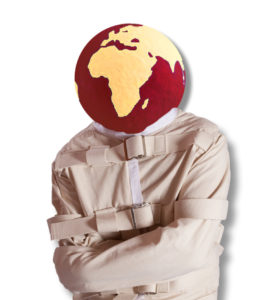by Pete Russell
Ahhh … fuck it.
Depression shows up in many ways: sadness, sluggishness, feeling unable to get out of bed, losing interest in things you used to be passionate about. One of the most debilitating manifestations of depression is hopelessness.
When hopelessness takes over my mind, I feel like I have a “case of the fuck-its.” Why bother, you know? Who cares about that, fuck it. Who wants to go out, fuck it. Who wants to do that thing that needs to be done, fuck it. I’ve got a case of the fuck-its.
For me personally, when I lose hope, it becomes insidious. It bleeds into everything. It transcends depression and becomes a worldview. Especially in today’s political climate, where it feels as if the big-money bastards have taken over, where it feels like society on the whole is on a collision course with disaster, personal depression becoming worldview is especially overwhelming.
Rediscovering Hope
There’ve been periods in my life when a case of the fuck-its could last for months. I mostly a pretty positive guy, but when hopelessness gets its hooks in me it can be hard to get out of it.
There are a few things that I found that help to shift my perspective when I feel hopeless. They don’t work every time, maybe, and they might not work for everybody, maybe, but one thing’s for sure: taking a small step is better than doing nothing.
#1 – fresh air and exercise. When I get a case of the fuck-its, it’s easy for me to get lazy and stay inside. I’m disabled and semi retired, so I don’t have a job to go to. That makes it even more pronounced when I’m feeling hopeless. But here’s the thing: the human body is quite a miraculous thing, and your body manufactures its own feel-good chemicals when you exercise. Also, we evolved in nature. Our bodies were designed to be out among the trees and getting natural sunlight. Ancient peoples talk about the healing power of communing with nature, and in the “civilized” Western world we’ve lost contact with that healing power.
It’s hard to for me to get out because of my disability, and that’s what makes it even more important to do so. Fortunately, even though I live in San Francisco, I’m close enough to Golden Gate Park that I can get out among the trees where there are birds and squirrels and bumblebees and whatnot. I’m a freak for bumblebees, and they always boost my spirits.
Can getting out for a walk among the trees overcome hopelessness for you? Maybe. It surely can’t hurt to try, it makes me feel better.
#2 – diet and nutrition, especially B vitamins. Plenty of research has shown that B vitamins can be great for depression. This is especially true for B-12 and niacin, B-3. I’ve noticed that when I take those supplements my depression is much better. I feel much more hopeful. If I let them lapse, I often pay the price in terms of my mental health.
Also, because of my disability, it’s hard for me to take the time and energy for food prep. Because of that, I eat a lot of processed food. Way too often, I pull something out of the freezer and stick it in the microwave. That means I’m not getting the nutrition I really need.
And so I try to force myself to eat better. I buy fresh fruits and vegetables fairly often, and try to make it a goal to eat them before they go bad. I hate to throw out rotten vegetables that I didn’t eat because I was too busy eating microwave crap.
If your physiology is anything like mine, take a lesson from somebody who’s been there and give B vitamins a try. I just buy a normal B complex, or especially a high potency one. You don’t need to worry about side effects of taking too many B vitamins, your body flushes them out really quickly. That’s one of the reasons it’s easy to get depleted, they’re water-soluble and your body does not store B vitamins for long. You really have to get B vitamins every day. I also take a B-12 supplement in a B-3 niacin supplement.
Can taking be vitamins overcome hopelessness for you? Maybe. Just the same as with exercise, it surely can’t hurt to try, it makes me feel better.
#3 – do something for others. Giving of yourself, volunteering, trying to make a difference for someone else; there’s real magic in that. The hopelessness part of depression, I think, has roots in low self-esteem. Partly because of my disability, I have miserable self-esteem a lot of the time. I feel like I don’t make a difference in the world.
So, I try to make a difference in the world, helping an organization that needs volunteers. Even if my efforts make a small contribution to somebody else’s well-being, or somebody else’s happiness, or helps improve somebody else’s day, it means I’m making a difference. It also takes my mind off of me, and shifts my thoughts to helping others. It shifts my thoughts to what I can do to improve someone else’s life. That way, at least for a short period of time, my intention is not on me. My attention is on giving someone else hope. And I think that hope can grow as a gift; if you give it away, it makes it easier for you to have it.
There are a couple places that I volunteer, and wherever you are, if you struggle with depression, I recommend that you pitch in to make a difference for others. Even if it doesn’t help with your depression, it will help somebody else. And that’s worth doing just for itself.
#4 – don’t keep it inside – talk to a loved one. A lot of us who suffer with mental health issues don’t want it to be known. We try to hide it, or mask it, or pretend it isn’t there. Putting on a brave face doesn’t help if you’re suffering inside.
It really helps to talk it out. Sometimes, nothing can help lift hopelessness more than unburdening. In my personal experience, therapy helps – talking to a professional can be tremendously valuable for dealing with depression and anxiety. But if you’re not sharing it with the ones you love, then you’re keeping it bottled up where it matters the most.
So I encourage you, don’t be afraid to talk about what’s up for you with the people that matter most. Talk to family, talk to your closest friends. When you unburden your pain, with the people that matter, I believe that that’s where the real healing takes place. Therapy is great. But loved ones are what really matter.
Goodbye to the "Fuck Its"
Sometimes it feels like the "fuck-its" are here to stay. At least for me, that’s not true. At the very least, they come and go. And when they show up, at least I know what to do now.
The steps that I mentioned above don’t work every time for me. But they work most of the time. And, taking one of the actions above, or several – even if it doesn’t work, at least I’m taking action. Sitting and letting a case of the fuck-its get the better of me doesn’t get me anywhere. Taking action puts me in control.
And that gives me hope.


